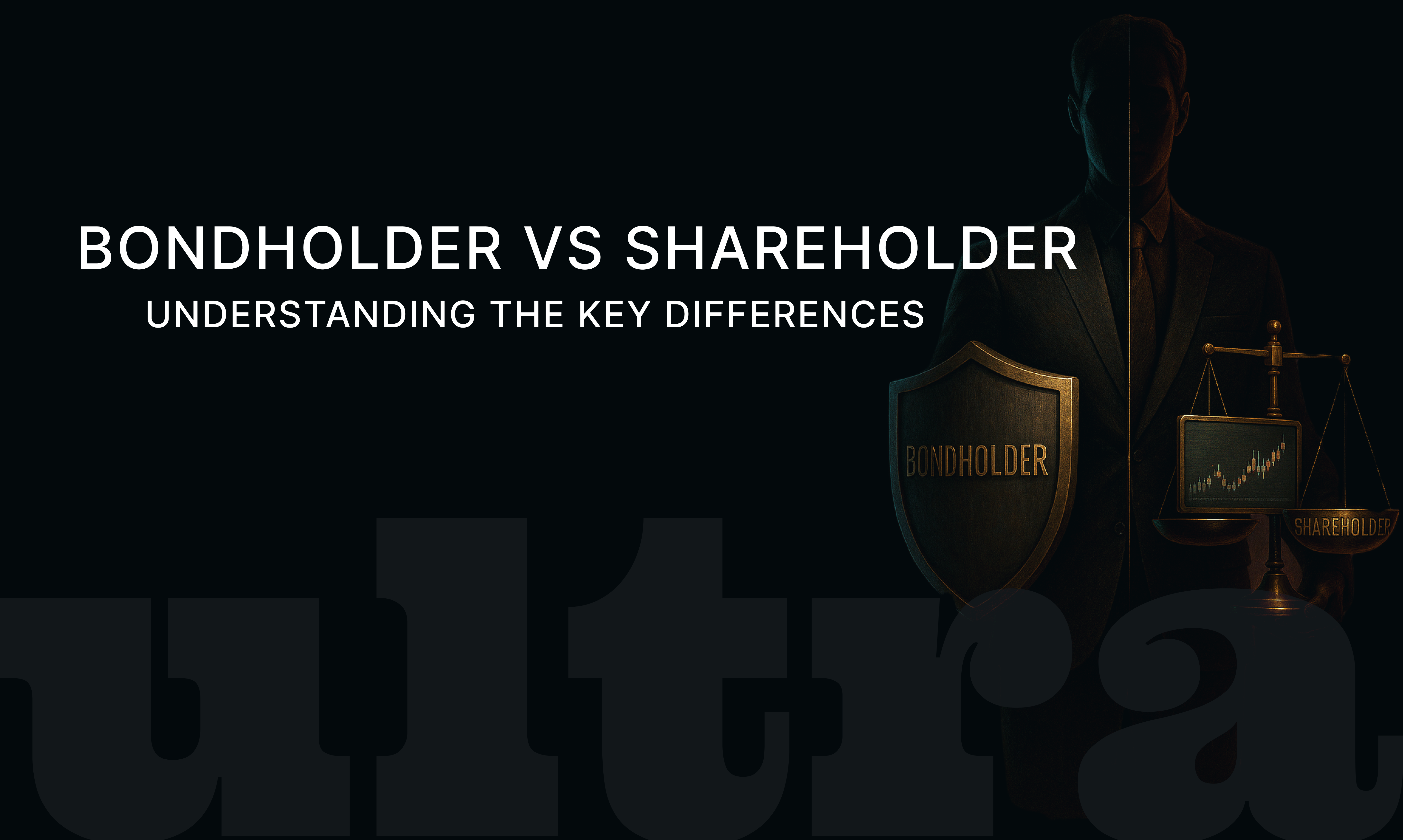Bondholder vs Shareholder: Understanding the Key Differences
14 July 2025 · Sachin Gadekar
Bondholder vs Shareholder: Understanding the Differences

How to Balance Stocks and Bonds
Many investors prefer a mix of both. For example, you might keep 60% in stocks and 40% in bonds to balance growth and safety.
At Ultra, we help you discover multiple investment opportunities — from corporate bonds to equity-linked instruments — so you can create a portfolio aligned with your goals.
Why Knowing the Difference Matters
Understanding the difference between bondholder and shareholder helps you:
Make informed decisions.
Diversify your portfolio wisely.
Manage risk better.
Align investments with your financial goals.
When you know how stocks and bonds work together, you can take advantage of market upsides while protecting yourself from downturns.
Real-World Example
Imagine you invested ₹5 lakh in bonds and another ₹5 lakh in shares of the same company:
If the company profits, your shares may appreciate and you may get dividends.
If the company struggles but doesn’t default, your bonds will still pay interest.
In worst case of liquidation, bondholders will have first claim over shareholders.
FAQs on Bondholders vs Shareholders
1. Who gets paid first — bondholder or shareholder?
Bondholders are paid before shareholders during liquidation since they are creditors, not owners.
2. Do bondholders get dividends?
No. Bondholders receive fixed interest payments, while shareholders receive dividends if the company declares them.
3. Can bondholders vote in company meetings?
No. Bondholders do not have voting rights. Shareholders can vote on company matters.
4. Are bonds safer than shares?
Generally, yes. Bonds offer lower returns but carry less risk compared to stocks.
5. Which is better for beginners: stock or bond?
It depends on your risk appetite. Conservative investors prefer bonds for steady returns; those seeking growth may choose stocks.
Final Thoughts
Both bondholders and shareholders play an important role in the capital markets. Knowing their differences — in ownership, returns, risks, and rights — is essential for smarter investing.
Whether you want steady interest income or potential high returns from equity, Ultra helps you explore the right opportunities for your financial journey.
Explore your investment options with Ultra at and make informed choices today.
Introduction
When it comes to investing, two terms often come up — bondholder and shareholder. These are fundamental to anyone looking to grow wealth through markets. But what exactly do they mean, and how do they differ?
At Ultra (https://getultra.club), we help investors explore diverse investment options, from fixed income to equities, and understanding bondholder vs shareholder is crucial to building a balanced portfolio.
This guide breaks down:
What is a bondholder?
Who is a shareholder?
Key differences between bondholder and shareholder
Stock vs bond: which is right for you?
Advantages and risks for each.
What is a Bondholder?
A bondholder is an investor who owns bonds issued by a company, government, or institution. A bond is essentially a loan given by the investor to the issuer, in exchange for periodic interest payments and the return of principal on maturity.
Features of Bondholders:
Receive fixed interest income (coupon) at regular intervals.
Do not own part of the company.
Have a legal right to receive payment before shareholders if the company liquidates.
Bonds have a fixed maturity period.
For example, if you buy a 5-year corporate bond at ₹1 lakh with 7% annual interest, you become a bondholder. The company pays you interest every year and repays your principal after five years.
Key Difference Between Bondholder and Shareholder
| Aspect | Bondholder | Shareholder |
|---|---|---|
| Ownership | Lender, no ownership | Partial owner of company |
| Returns | Fixed interest income | Dividends + capital gain |
| Risk Level | Lower risk | Higher risk |
| Voting Rights | None | Yes |
| Priority in Liquidation | Paid first | Paid last |
| Maturity | Fixed tenure | No maturity, can hold or sell anytime |
| Control | No say in company management | Can vote, attend AGMs |
Stock vs Bond: Which Should You Choose?
Stocks (shares) and bonds serve different investment purposes. Stocks are suited for long-term growth and wealth creation but carry higher market risk. Bonds provide steady income and capital preservation with lower risk.
When to consider bonds:
If you want stable income.
If you have low risk appetite.
If you need predictable cash flow for a fixed tenure.
When to consider stocks:
If you seek higher returns and can handle market volatility.
If you aim for long-term wealth creation.
If you want ownership and voting rights in companies.